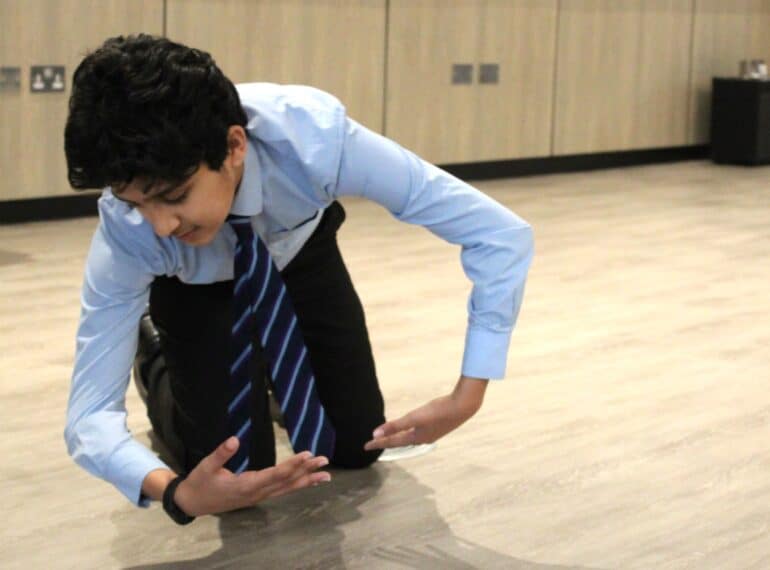
Having won QE’s internal round of the national Performing Shakespeare competition and made it through the London heats, Year 8’s Vihaan Pal then performed strongly in the regional final held at the School.
 Vihaan, pictured here and top, delivered the speech from Romeo and Juliet given by Romeo as he lay dying – giving a repeat of his performance in School, which was praised for its maturity and sensitivity.
Vihaan, pictured here and top, delivered the speech from Romeo and Juliet given by Romeo as he lay dying – giving a repeat of his performance in School, which was praised for its maturity and sensitivity.
The regional heats and final were both hosted by QE, in the Main School Hall and Friends’ Recital Hall respectively. Two boys had reached the semi-finals, Vihaan and Daiwik Khedekar, with Vihaan progressing to the regional final.
Head of English Robert Hyland said: “Performing Shakespeare is integral to student understanding: as we remind the boys, Shakespeare’s plays were written not to be studied in class, but performed in theatres. Learning and performing a speech requires students to make judgements about what a character is saying, and how this will affect things like their movement, their vocal tone, and their interaction with the audience, in a way which analysing in an essay is not able to.
 “We were therefore delighted to host two rounds of the competition. Although Vihaan did not progress through the regional final, he did very well to make it through the semi-finals and is to be congratulated on a series of accomplished performances.
“We were therefore delighted to host two rounds of the competition. Although Vihaan did not progress through the regional final, he did very well to make it through the semi-finals and is to be congratulated on a series of accomplished performances.
“At QE, we recognise the importance of oracy and the ability to perform in front of others as important skills that will help our boys in their later lives and careers. That is why the School has invested heavily in the new Robert Dudley Studio for drama and the spoken word, which is now nearing completion.”
All Year 8s were invited to take part in the internal round of the competition and could choose any speech from a Shakespeare play. They initially learned their speeches during the Autumn Term (alongside their studies of Macbeth).
 The boys were judged not only on their physical performance and their vocalisation, but on how far their performance suited the speech, and how far their interpretation of the speech met their artistic intention.
The boys were judged not only on their physical performance and their vocalisation, but on how far their performance suited the speech, and how far their interpretation of the speech met their artistic intention.
Vihaan said: “The reason I chose my piece [Romeo’s Dying Scene from Act 5 Scene 3] is because I found it inspiring that the message is so simple, clear in its affirmation of the power of love over hate, and showing the strong loyalty Romeo had for Juliet. Although it is different from the classic booming speech with loud expressions, I felt that the acting of this piece with the sad tone, the detailed imagery, and the soft movements made me feel like I was really there.”
Their classroom teachers judged the QE boys’ initial attempts, while the judges in the School final were Kanak Shah, Extra-curricular Enrichment Lead and an English & French teacher, Head of Year 8 Andrew Collins, and Sixth Form actor Keiaron Joseph.
 Ms Shah praised the work that the QE boys put into their performances. “I was amazed by the vulnerability of some of these speeches and the maturity and sensitivity with which they were delivered. These qualities were particularly obvious in the speech of our winner Vihaan, who chose Romeo’s last speech to Juliet. He conjured Juliet’s body out of thin air with his delivery of Shakespeare’s words, and his choice of a vulnerable speech was a brave one.”
Ms Shah praised the work that the QE boys put into their performances. “I was amazed by the vulnerability of some of these speeches and the maturity and sensitivity with which they were delivered. These qualities were particularly obvious in the speech of our winner Vihaan, who chose Romeo’s last speech to Juliet. He conjured Juliet’s body out of thin air with his delivery of Shakespeare’s words, and his choice of a vulnerable speech was a brave one.”
Dr Collins said that the boys had shown the full range of emotions when they took to the stage, “from rallying battle cries to internal moments of anguish”. He added: “It was extremely difficult to come up with a winner; Vihaan’s portrayal of Romeo was very tender and he showed great power on the stage even when in such a compact physical form on the floor – a very worthy winner.”

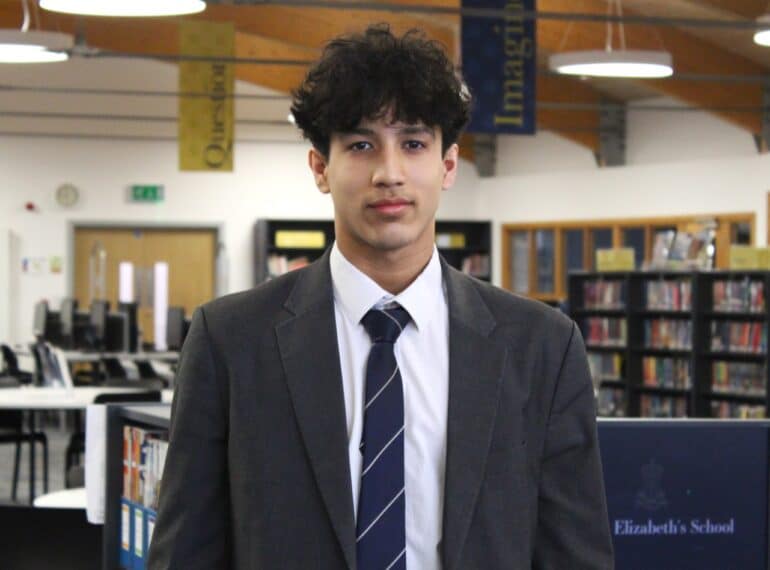
 Suryansh Sarangi was selected as one of nine overall winners – and one of only two from outside the US – after penning a review that commented not only on the clothes, but on the collection’s relationship to the American dream.
Suryansh Sarangi was selected as one of nine overall winners – and one of only two from outside the US – after penning a review that commented not only on the clothes, but on the collection’s relationship to the American dream. The city, he noted, carried special significance for Balenciaga’s creative director, Demna Gvasalia: “Having grown up in a dreary ‘post-Soviet vacuum’, Demna himself states that the very culture he idolized as the perfect, colorful life was that of L.A.”
The city, he noted, carried special significance for Balenciaga’s creative director, Demna Gvasalia: “Having grown up in a dreary ‘post-Soviet vacuum’, Demna himself states that the very culture he idolized as the perfect, colorful life was that of L.A.” “I did not have to research much; I just had to watch the fashion show on YouTube, and from there, it was just about interpreting it and analysing it beyond its face value.
“I did not have to research much; I just had to watch the fashion show on YouTube, and from there, it was just about interpreting it and analysing it beyond its face value.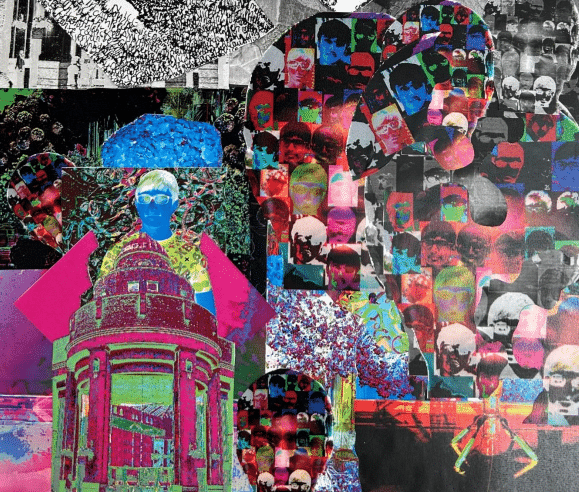
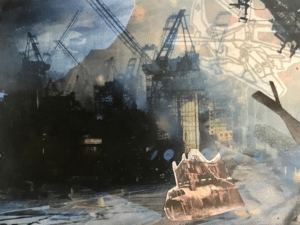 The 44-page publication features 26 pieces of poetry, prose, and art, many of them inspired by its anniversary-related theme, How did we get here? The approach, looking both backward and forward, mirrors that of the School’s anniversary celebrations on Founder’s Day which included a display of the School’s 1573 Royal Charter alongside the burying of a time capsule intended for the pupils of 2073, when QE will mark its 500th anniversary. Work on the magazine began last academic year, but it has only now been published.
The 44-page publication features 26 pieces of poetry, prose, and art, many of them inspired by its anniversary-related theme, How did we get here? The approach, looking both backward and forward, mirrors that of the School’s anniversary celebrations on Founder’s Day which included a display of the School’s 1573 Royal Charter alongside the burying of a time capsule intended for the pupils of 2073, when QE will mark its 500th anniversary. Work on the magazine began last academic year, but it has only now been published.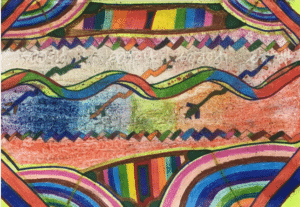 The poetry section is highly varied, with contributions ranging from Year 9 boy Yingqiao Zhao’s piece about the moon – which is in the shape of a crescent and has key words picked out in different colours – to the nine-stanza rhyming French poem, La Mort de L’Ancien, composed by Year 13’s Aayush Backory. The poetry section closes with Nikhil Francine, of Year 9, addressing the anniversary directly with a poem entitled Thriving from Ancient Roots – the School’s slogan for the anniversary year.
The poetry section is highly varied, with contributions ranging from Year 9 boy Yingqiao Zhao’s piece about the moon – which is in the shape of a crescent and has key words picked out in different colours – to the nine-stanza rhyming French poem, La Mort de L’Ancien, composed by Year 13’s Aayush Backory. The poetry section closes with Nikhil Francine, of Year 9, addressing the anniversary directly with a poem entitled Thriving from Ancient Roots – the School’s slogan for the anniversary year. Interspersed throughout The Arabella are artworks exploring themes including Expressive Heads, Distortion and Identity; Dystopian Landscape; and Art Inspired by Music. Shown in this news story, from top to bottom, are:
Interspersed throughout The Arabella are artworks exploring themes including Expressive Heads, Distortion and Identity; Dystopian Landscape; and Art Inspired by Music. Shown in this news story, from top to bottom, are: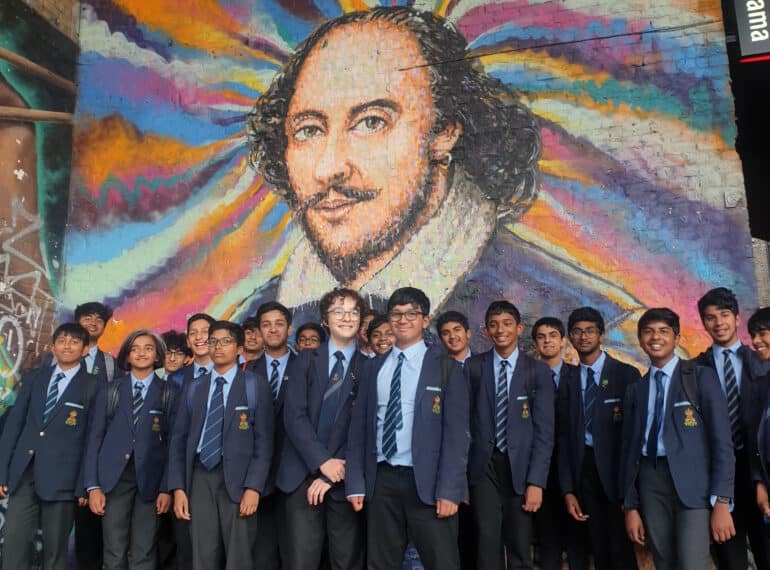
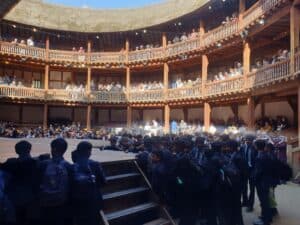 The visit by the whole year group over three days was only the latest in a series of QE trips to the Globe: in the last three months, more than 400 boys and staff have travelled down the Northern Line to see Shakespeare plays at the modern reconstruction close to the site of the 17th-century theatre.
The visit by the whole year group over three days was only the latest in a series of QE trips to the Globe: in the last three months, more than 400 boys and staff have travelled down the Northern Line to see Shakespeare plays at the modern reconstruction close to the site of the 17th-century theatre.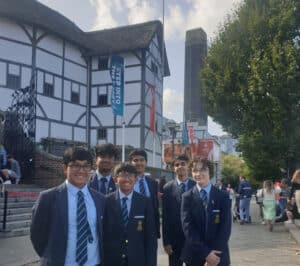 Other recent trips to the Globe have been to see two comedies: A Midsummer Night’s Dream and The Comedy of Errors, set respectively in the ancient cities of Athens, Greece, and Ephesus, in modern-day Türkiye (Turkey).
Other recent trips to the Globe have been to see two comedies: A Midsummer Night’s Dream and The Comedy of Errors, set respectively in the ancient cities of Athens, Greece, and Ephesus, in modern-day Türkiye (Turkey).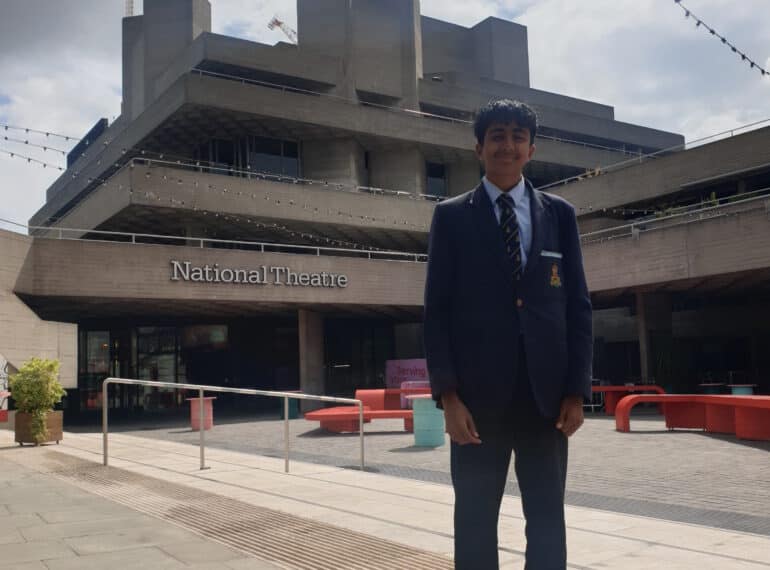
 Head of English Robert Hyland said: “Many congratulations to Adithya for a wonderful achievement. For someone as young as him to produce such a powerful piece of writing is truly astonishing – and for a student to have their work performed at the National Theatre is unprecedented in the School’s history.
Head of English Robert Hyland said: “Many congratulations to Adithya for a wonderful achievement. For someone as young as him to produce such a powerful piece of writing is truly astonishing – and for a student to have their work performed at the National Theatre is unprecedented in the School’s history.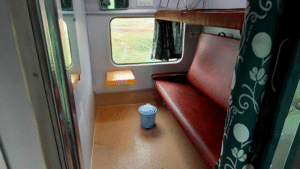 His play was a philosophical and reflective story about a British-Indian teenager taking a train ride across southern India after his mother’s death, and the relationship he developed both with his father and with the country of India.
His play was a philosophical and reflective story about a British-Indian teenager taking a train ride across southern India after his mother’s death, and the relationship he developed both with his father and with the country of India.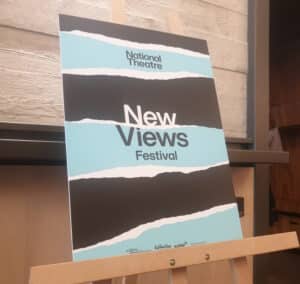 Adithya’s mentor, Andrew Muir, has had plays produced throughout the UK and in recent years his work has been performed at the National Theatre’s Connections festival, at Soho Theatre and on the BBC. His assessment of Adithya’s play described it as “a joyous road trip of a story, in which both father and son are brought back together again following the devastating loss of their wife and mother respectively.
Adithya’s mentor, Andrew Muir, has had plays produced throughout the UK and in recent years his work has been performed at the National Theatre’s Connections festival, at Soho Theatre and on the BBC. His assessment of Adithya’s play described it as “a joyous road trip of a story, in which both father and son are brought back together again following the devastating loss of their wife and mother respectively.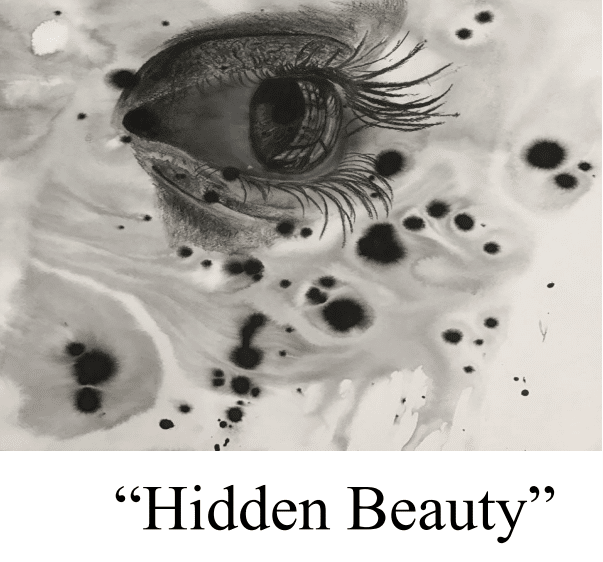
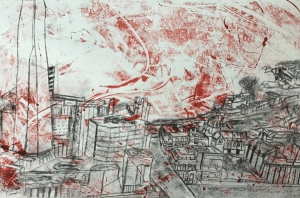
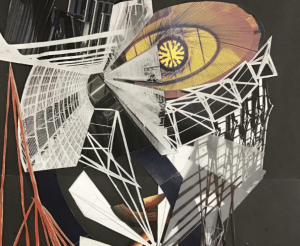 Six artists’ work is featured, including the front-cover illustration by Year 13’s Dylan Domb, pictured top, and pieces by Gabriel Gulliford (also Year 13), above right, and Year 12’s Pratham Bhavsar, left.
Six artists’ work is featured, including the front-cover illustration by Year 13’s Dylan Domb, pictured top, and pieces by Gabriel Gulliford (also Year 13), above right, and Year 12’s Pratham Bhavsar, left.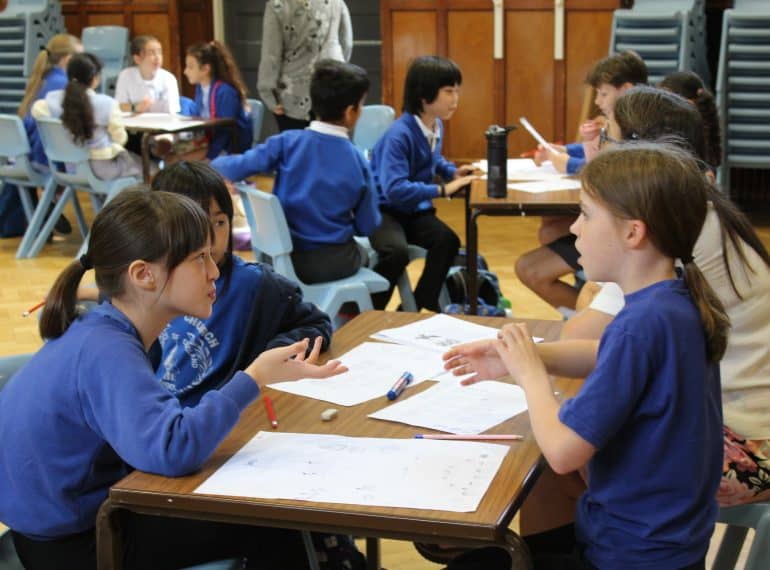
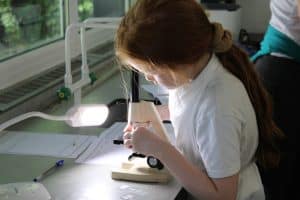 The events, which are part of QE’s partnerships work with the local community, are aimed at giving Year 5 girls and boys an early taste of secondary school education.
The events, which are part of QE’s partnerships work with the local community, are aimed at giving Year 5 girls and boys an early taste of secondary school education. The first of the three days was the ever-popular Primary Forensics Workshop. The visitors were tasked with completing a number of experiments and analyses to work out who had murdered the Headmaster!
The first of the three days was the ever-popular Primary Forensics Workshop. The visitors were tasked with completing a number of experiments and analyses to work out who had murdered the Headmaster!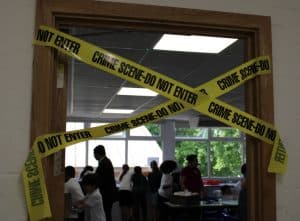 Boys from Year 12 helped staff run this workshop, engaging with the children at each station.
Boys from Year 12 helped staff run this workshop, engaging with the children at each station.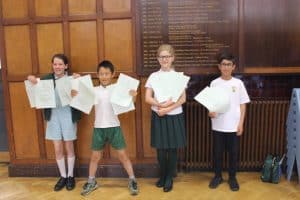 Firstly, teams were given the challenge of designing a castle on paper. They had to base their design on a certain set of criteria and follow a budget, requiring them to decide which features they wanted to prioritise.
Firstly, teams were given the challenge of designing a castle on paper. They had to base their design on a certain set of criteria and follow a budget, requiring them to decide which features they wanted to prioritise.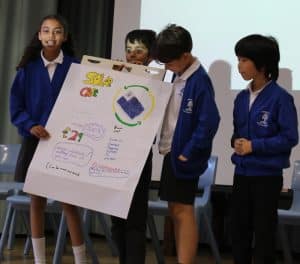 There was then a Sustainability Challenge run jointly by Geography and Economics. The children had to work in groups and devise a sustainable product. They designed their product, chose a logo and decided on their target market. Then each group presented to the other children in attendance. Among the ideas generated were: a mobile phone where the case is a solar panel and charges the phone, and a ‘plastic’ bottle where the bottle itself is biodegradable.
There was then a Sustainability Challenge run jointly by Geography and Economics. The children had to work in groups and devise a sustainable product. They designed their product, chose a logo and decided on their target market. Then each group presented to the other children in attendance. Among the ideas generated were: a mobile phone where the case is a solar panel and charges the phone, and a ‘plastic’ bottle where the bottle itself is biodegradable.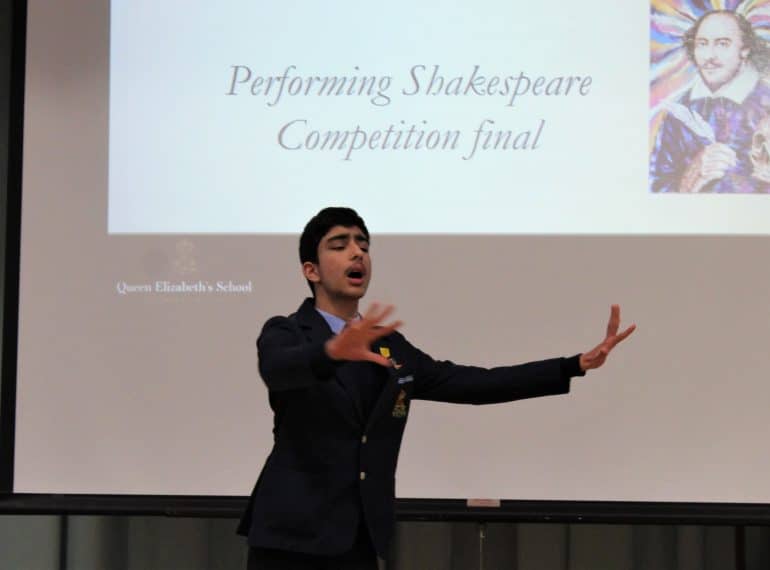
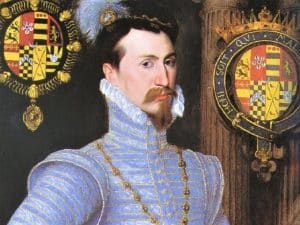 “It was Leicester, one of the great figures of the Elizabethan age, a leading patron of the theatre and, of course, a near-contemporary of Shakespeare, who, in 1573, asked Queen Elizabeth I for the Charter to establish Queen Elizabeth’s School,” said Mr Enright. “Thus, our Shakespeare Festival Week in a sense honours his legacy to the arts as we prepare to celebrate the 450th anniversary of our School next year. We are seeking to build on that legacy today through promoting drama and through the central importance we attach to oracy and verbal communication.”
“It was Leicester, one of the great figures of the Elizabethan age, a leading patron of the theatre and, of course, a near-contemporary of Shakespeare, who, in 1573, asked Queen Elizabeth I for the Charter to establish Queen Elizabeth’s School,” said Mr Enright. “Thus, our Shakespeare Festival Week in a sense honours his legacy to the arts as we prepare to celebrate the 450th anniversary of our School next year. We are seeking to build on that legacy today through promoting drama and through the central importance we attach to oracy and verbal communication.”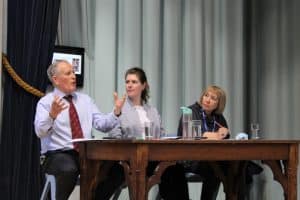 For the final, the English department drafted in their own panel of ‘guest’ judges – History and Politics teacher Liam Hargadon, Head of Geography Emily Parry and Mrs Elaine White, retired teacher of drama at QE. The event was hosted by Assistant Head (Pupil Involvement) Crispin Bonham-Carter.
For the final, the English department drafted in their own panel of ‘guest’ judges – History and Politics teacher Liam Hargadon, Head of Geography Emily Parry and Mrs Elaine White, retired teacher of drama at QE. The event was hosted by Assistant Head (Pupil Involvement) Crispin Bonham-Carter.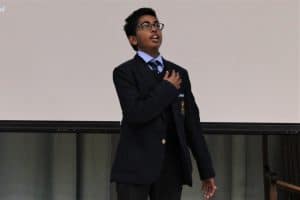 “The overall House winner was Stapylton; Snehal Das gave a powerful empathetic performance as Shylock from The Merchant of Venice, and Nimesh Nirojan seemed like he was speaking to thousands in the Roman forum as he gave Antony’s funeral oration from Julius Caesar.”
“The overall House winner was Stapylton; Snehal Das gave a powerful empathetic performance as Shylock from The Merchant of Venice, and Nimesh Nirojan seemed like he was speaking to thousands in the Roman forum as he gave Antony’s funeral oration from Julius Caesar.”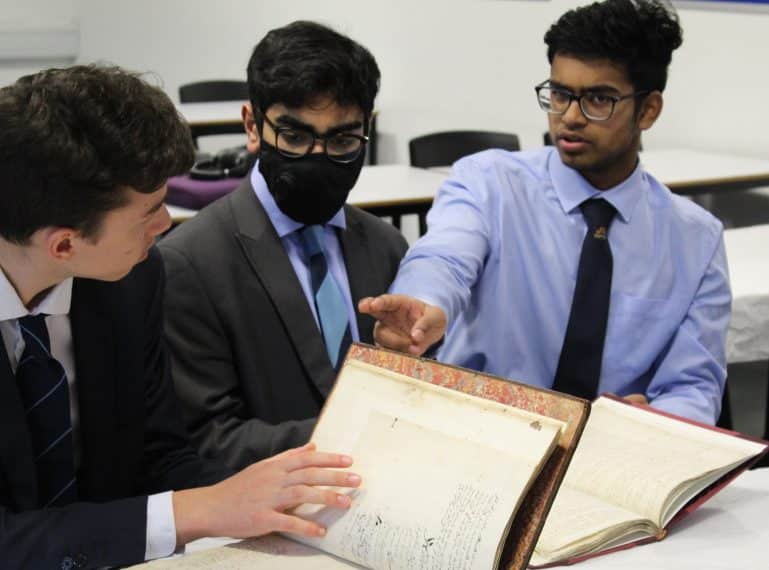
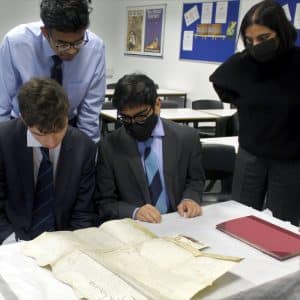 English teacher Kanak Shah has brought together a group of dedicated Year 12 boys and trained them in palaeography – the study of ancient and pre-modern manuscripts.
English teacher Kanak Shah has brought together a group of dedicated Year 12 boys and trained them in palaeography – the study of ancient and pre-modern manuscripts.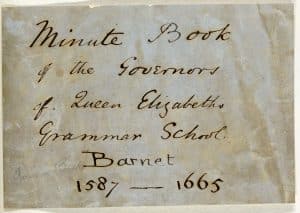 “The earliest documents present an interesting challenge as they were written before the standardisation of handwriting, and so require careful decoding,” said Ms Shah.
“The earliest documents present an interesting challenge as they were written before the standardisation of handwriting, and so require careful decoding,” said Ms Shah.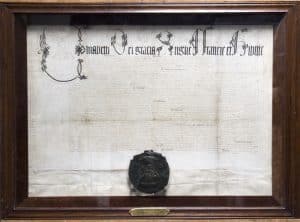 It is not clear who made the the Barnet Museum transcription, which was completed some time prior to 1931. The preface to the museum’s collection of QE translations and transcriptions was written in May 1931 by Cecil L Tripp, author of A History of Queen Elizabeth’s Grammar School, published 1935.
It is not clear who made the the Barnet Museum transcription, which was completed some time prior to 1931. The preface to the museum’s collection of QE translations and transcriptions was written in May 1931 by Cecil L Tripp, author of A History of Queen Elizabeth’s Grammar School, published 1935.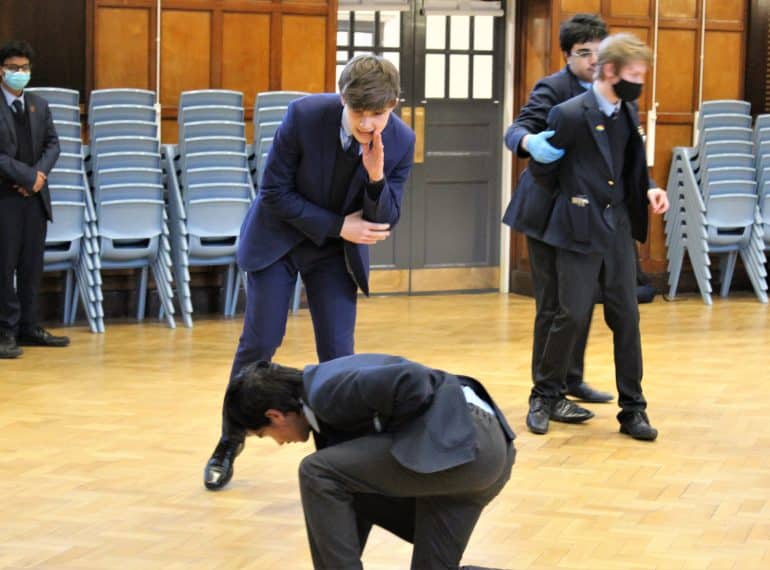
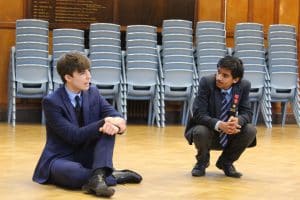 The production will also form part of QE’s homegrown Shakespeare festival, along with a diverse programme of other activities, ranging from an academic lecture to an inter-House competition.
The production will also form part of QE’s homegrown Shakespeare festival, along with a diverse programme of other activities, ranging from an academic lecture to an inter-House competition.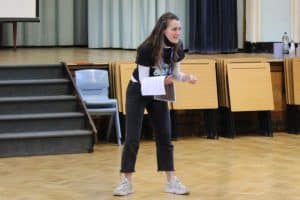 The play tells the story of an African general, Othello, in the 16th-century Venetian army who is tricked into suspecting his wife of adultery. Sexual jealousy and racial prejudice are among its leading motifs. In it, the sinister standard-bearer, Iago, manipulates Othello into a jealous rage, but all the while appears to warn his commander against the destructive emotion: “O beware, my lord, of jealousy; It is the green-eyed monster which doth mock the meat it feeds on” – the first coinage of the term “green-eyed monster”. Other quotations from the play that have become the stuff of everyday speech include: “‘T’is neither here nor there” and “I will wear my heart upon my sleeve”.
The play tells the story of an African general, Othello, in the 16th-century Venetian army who is tricked into suspecting his wife of adultery. Sexual jealousy and racial prejudice are among its leading motifs. In it, the sinister standard-bearer, Iago, manipulates Othello into a jealous rage, but all the while appears to warn his commander against the destructive emotion: “O beware, my lord, of jealousy; It is the green-eyed monster which doth mock the meat it feeds on” – the first coinage of the term “green-eyed monster”. Other quotations from the play that have become the stuff of everyday speech include: “‘T’is neither here nor there” and “I will wear my heart upon my sleeve”.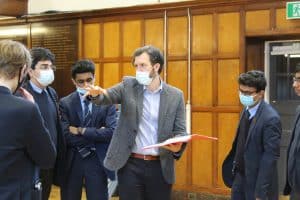 The pupils workshopped a section of the abridged production, with Emma Howell and QE’s resident theatre director, Gavin Malloy, then working with the cast on their positioning, movement and characterisation, in order to help build a dynamic piece.
The pupils workshopped a section of the abridged production, with Emma Howell and QE’s resident theatre director, Gavin Malloy, then working with the cast on their positioning, movement and characterisation, in order to help build a dynamic piece.